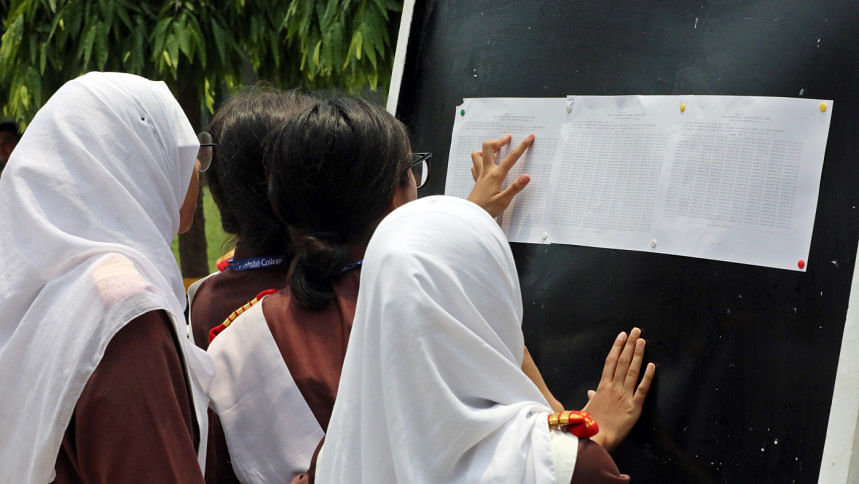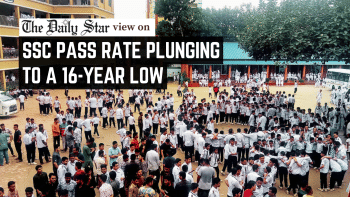Who will own up to the SSC debacle?

In the 1980s, I remember writing an argumentative essay titled "Floods: A Boon or a Bane?" for our school examinations. The key argument lay in the benefits of alluvial silt brought in by floodwater, resulting in better crops after the natural calamity. The disaster in this year's Secondary School Certificate (SSC) and equivalent examinations made me reflect on the debate. There are two ways we can analyse the failure of more than six lakh students and the decline in the number of GPA 5 achievers. We can view the decline in the general board pass rate to 68.04 percent from the 80-90 percent in the previous 16 years as a bane. Then again, the decrease is a boon, as it is a reported consequence of a long-overdue return to academic integrity, moving away from the culture of inflated data and auto-passes that reduced our public examination system to a farce.
The planned avoidance of cosmetic excellence at the expense of raw reality, however, has jolted many students and their institutions. The list of schools with 100 percent unsuccessful candidates is long. Witnessing guardians beating up headmasters was not a pretty sight. The shocking results are a wake-up call for a system that is demanding meritocracy. And while we are aware of the situation, we need to ask a deeper and uncomfortable question: who has failed these students—a tough exam, an inconsistent, fragile, and underfunded system, or a climate of political and social unrest? Someone has to take responsibility for the failure, especially for the untimely losses of young lives after the results came out. Otherwise, the corrective reform measures will be a display of apathy.
The authorities have made no secret of their renewed commitment to rigorous assessment. They have even withdrawn the provision for grace marks for marginal cases. The highest number of students have failed in mathematics. The cleansing flood has become a personal disaster for the students, especially those from rural and marginalised backgrounds, who have little or no resources to compete in an academic atmosphere that relies heavily on the internet and gadgets. One thing is clear: many of these students failed because, as a state, we failed to prepare them for the school terminal exam. Their underperformance is a symptom of systemic neglect.
Let's identify the avoidable missteps that have led these students to experience this harsh reality. After the recent change in government, there was a sudden decision to return to the 2012 model of examination. The competency-based curriculum was rejected midstream. The compromise was a shortened syllabus with barely three months for the teachers and students to adjust.
The curriculum switch required mass-scale teacher orientation and training for both teaching and testing. Teachers, like students, were left to scramble. The number of students who failed indicates that the screening mechanisms used in tests and pre-tests were ineffective. I don't know whether there was any institutional counselling or monitoring for learning losses at the board level. Teachers reportedly anticipated the issues with the results. Despite the red flags, students were allowed to participate in the high-stakes exams unprepared. While people harp on the success of merit-based reform, they will have to bear the scars of failure. These six lakh students are more than numbers on an Excel sheet; they are young people with dreams and potential actors of our demographic dividends. The challenge now is to bring them back to school and equip them with knowledge and skills to join the career ladder.
The shocking results are a wake-up call for a system that is demanding meritocracy. And while we are aware of the situation, we need to ask a deeper and uncomfortable question: who has failed these students—a tough exam, an inconsistent, fragile, and underfunded system, or a climate of political and social unrest? Someone has to take the responsibility for the failure. Otherwise, the corrective reform measures will be a display of apathy.
Prothom Alo identifies three key factors behind this year's underperformance in the SSC exams. Political unrest further exacerbated the severe learning loss that had occurred in the post-pandemic period. The exceptionally challenging mathematics question paper was also a significant factor. Consequently, 23 percent of students in the 11 boards failed in mathematics. Imposition of stricter assessment standards and clear instructions against liberal marking also played a role.
The number of failures in humanities (around 46 percent) and business studies (around 34 percent) has a cumulative effect on the overall pass mark. Despite the negative news, our female students continue to excel in all fields. Girls opened up a gender gap of over five percentage points (about 71 percent of girls passed, compared to around 65 percent of boys) and also outperformed their peers in GPA scores. Such achievement is a testimony of their focused and disciplined commitment to move up in society. Their resilience and motivation should not be hindered by any obstacles. It is the duty of the state actors to ensure the fair passage for our top performers.
The other challenge is to remove the disparity between urban and rural schools. Is it fair to employ the same standard questions when not all institutions have the same access to quality teachers and secondary resource support bases? Is it fair for rural schools lacking electricity or internet connections to compete against schools with loaded learning environments? How about the learning gap induced by these infrastructural deficiencies?
While we all agree that false academic laurels that claim "I am GPA 5" are detrimental to education, we also need to acknowledge the failures of our younger generation. We need educational and psychological counselling for both teachers and students. The reform came as a sudden top-down administrative flash flood, which washed away over six lakh students. We need reforms in phases. We need administrative support to make adjustments to the planned changes. Otherwise, educational reform will turn out to be educational recklessness.
Do we not owe our young ones better? The answer is unequivocally affirmative. To achieve this, we need to rebuild our foundational literacy and numeracy starting from the primary level. We need to strengthen our learning diagnostics in classes 5 and 8 to identify gaps early. There should be regular alignment between teacher training and curriculum transitions. Textbooks must be made available before academic sessions. We need to place serious emphasis on school-level pre-tests to prepare students realistically for the public examinations. Finally, we need to provide psychosocial support to prevent trauma-induced dropout. We cannot afford to play with the fate of another generation in the name of reform. It's time we acted responsibly and assessed fairly. And above all, we must own up to our role not only in success but also in failure.
Dr Shamsad Mortuza is professor of English at Dhaka University.
Views expressed in this article are the author's own.
Follow The Daily Star Opinion on Facebook for the latest opinions, commentaries and analyses by experts and professionals. To contribute your article or letter to The Daily Star Opinion, see our guidelines for submission.

 For all latest news, follow The Daily Star's Google News channel.
For all latest news, follow The Daily Star's Google News channel. 










Comments